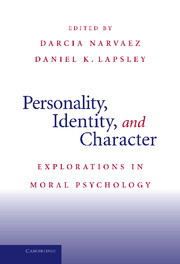Book contents
- Frontmatter
- Contents
- Contributors
- Introduction
- 1 The Moral Personality
- 2 The Moral Functioning of the Person as a Whole: On Moral Psychology and Personality Science
- 3 Moral Science? Still Metaphysical After All These Years
- 4 Cultural Pluralism and Moral Identity
- 5 Neuroscience and Morality: Moral Judgments, Sentiments, and Values
- 6 Triune Ethics Theory and Moral Personality
- 7 Early Foundations: Conscience and the Development of Moral Character
- 8 The Development of the Moral Personality
- 9 Urban Neighborhoods as Contexts for Moral Identity Development
- 10 Moral Personality Exemplified
- 11 Greatest of the Virtues? Gratitude and the Grateful Personality
- 12 The Elusive Altruist: The Psychological Study of the Altruistic Personality
- 13 Growing Toward Care: A Narrative Approach to Prosocial Moral Identity and Generativity of Personality in Emerging Adulthood
- 14 Moral Identity, Integrity, and Personal Responsibility
- 15 The Dynamic Moral Self: A Social Psychological Perspective
- 16 The Double-Edged Sword of a Moral State of Mind
- 17 Moral Identity in Business Situations: A Social-Cognitive Framework for Understanding Moral Functioning
- 18 The Moral Functioning of Mature Adults and the Possibility of Fair Moral Reasoning
- 19 Moral Personality: Themes, Questions, Futures
- Author Index
- Subject Index
3 - Moral Science? Still Metaphysical After All These Years
Published online by Cambridge University Press: 05 June 2012
- Frontmatter
- Contents
- Contributors
- Introduction
- 1 The Moral Personality
- 2 The Moral Functioning of the Person as a Whole: On Moral Psychology and Personality Science
- 3 Moral Science? Still Metaphysical After All These Years
- 4 Cultural Pluralism and Moral Identity
- 5 Neuroscience and Morality: Moral Judgments, Sentiments, and Values
- 6 Triune Ethics Theory and Moral Personality
- 7 Early Foundations: Conscience and the Development of Moral Character
- 8 The Development of the Moral Personality
- 9 Urban Neighborhoods as Contexts for Moral Identity Development
- 10 Moral Personality Exemplified
- 11 Greatest of the Virtues? Gratitude and the Grateful Personality
- 12 The Elusive Altruist: The Psychological Study of the Altruistic Personality
- 13 Growing Toward Care: A Narrative Approach to Prosocial Moral Identity and Generativity of Personality in Emerging Adulthood
- 14 Moral Identity, Integrity, and Personal Responsibility
- 15 The Dynamic Moral Self: A Social Psychological Perspective
- 16 The Double-Edged Sword of a Moral State of Mind
- 17 Moral Identity in Business Situations: A Social-Cognitive Framework for Understanding Moral Functioning
- 18 The Moral Functioning of Mature Adults and the Possibility of Fair Moral Reasoning
- 19 Moral Personality: Themes, Questions, Futures
- Author Index
- Subject Index
Summary
VIRTUOUS INTERDEPENDENCY
At the end of the Nicomachean Ethics, the most influential secular ethics text in the West (a set of lecture notes dutifully copied by Aristotle's son Nicomachus), Aristotle wrote (or taught) that he would next take up politics, which in any case he ought to have done before the ethics. It would have been equally sensible if Aristotle had written (or taught) the Politics first, that he might have had the reverse afterthought – namely, that he should now turn to moral psychology and ethics, to providing a theory of individual flourishing (eudaimonia) as well as a theory of human agency, the virtues, moral development, moral education, and weakness of the will (akrasia), which in any case he ought to have done first, before providing a theory of social or political good.
So which really comes first (or what is different, should come first) ethics, including what we now call moral psychology – moral development, affective and cognitive components of moral competence, and so on – or politics, including what we now call the theories of justice and social good? The answer to both the descriptive and normative questions is that ethics, moral psychology, and a conception of social and political good typically coevolve and depend upon each other conceptually. Thus this messy feature of interdependency is as it should be, as it must be. In the domain of morality, as a lived phenomenon and as an area of inquiry, neither philosophy nor psychology nor social and political theory serves as the foundation for any other.
- Type
- Chapter
- Information
- Personality, Identity, and CharacterExplorations in Moral Psychology, pp. 52 - 78Publisher: Cambridge University PressPrint publication year: 2009
- 13
- Cited by



